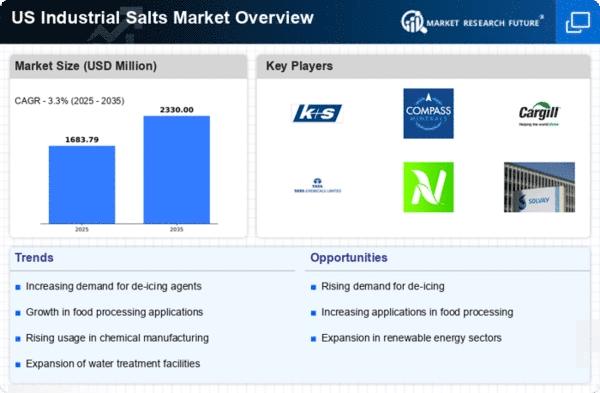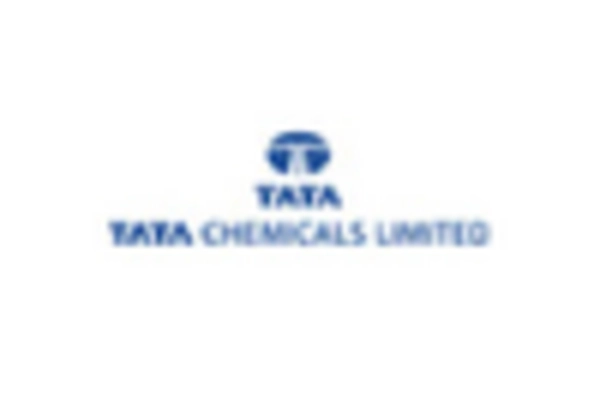The industrial salts market has a competitive landscape. This landscape is increasingly shaped by innovation, sustainability, and strategic partnerships. Key players such as Compass Minerals (US), Cargill, Inc. (US), and K+S AG (DE) are actively pursuing strategies that enhance their market positioning. Compass Minerals (US) focuses on expanding its product portfolio and enhancing operational efficiencies, while Cargill, Inc. (US) emphasizes sustainable practices and digital transformation to optimize its supply chain. K+S AG (DE) is investing in technological advancements to improve production processes, which collectively influences the competitive dynamics of the market.The market structure appears moderately fragmented, with several players vying for market share. Key business tactics include localizing manufacturing to reduce transportation costs and optimizing supply chains to enhance responsiveness to market demands. The collective influence of these major companies shapes a competitive environment where agility and innovation are paramount.
In October Compass Minerals (US) announced a strategic partnership with a leading technology firm to develop a new digital platform aimed at enhancing supply chain transparency and efficiency. This move is significant as it aligns with the growing trend of digitalization in the industrial sector, potentially allowing Compass to better meet customer demands and improve operational efficiencies.
In September Cargill, Inc. (US) launched a new line of eco-friendly industrial salts, which underscores its commitment to sustainability. This initiative not only caters to the increasing demand for environmentally responsible products but also positions Cargill as a leader in sustainable practices within the industry. The strategic importance of this launch lies in its potential to attract a broader customer base that prioritizes sustainability in their purchasing decisions.
In August K+S AG (DE) unveiled plans to invest €100 million in upgrading its production facilities in North America. This investment is aimed at enhancing production capacity and efficiency, which is crucial for meeting the rising demand for industrial salts. This investment is strategically important as it positions K+S to capitalize on market growth. It also improves its competitive edge through enhanced operational capabilities.
As of November current trends in the industrial salts market indicate a strong focus on digitalization, sustainability, and the integration of AI technologies. Strategic alliances are increasingly shaping the competitive landscape, allowing companies to leverage shared resources and expertise. Looking ahead, competitive differentiation is likely to evolve from traditional price-based competition to a focus on innovation, technology integration, and supply chain reliability, reflecting the changing dynamics of the market.

















